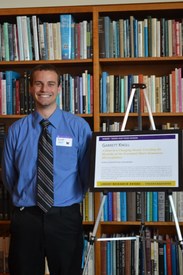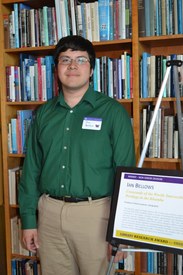Senior Thesis Division
|
Stefanie Jackson (History) Faculty Advisor: Sandra Joshel
Retelling Exodus: Cultural Negotiation Among Pennsylvanian Acadians “Retelling Exodus” focuses on one group amongst thousands of French Canadians expelled from Acadia, modern-day Nova Scotia, by the British in 1755 as the French and Indian War intensified. By 1790, many of the Acadians exiled during this “Grand Dérangement” had reunited and formed strong communities in New Brunswick and Louisiana, where they would become the Cajuns. However, relatively understudied in the expanse of the Acadian diaspora is the decade-long period after exile and before relocation to Louisiana when Acadians were resettled in American colonies: often harsh, inhospitable environments for Acadian culture. Pennsylvania in the mid-eighteenth century presents an interesting focus for questions of cultural adaptation because the colony contained a diverse demography of ethnic and religious groups. This research considers how the cultural, political, and religious landscape of 1750’s Pennsylvania contributed to diverse and fragmented patterns of resettlement and a practice of cultural negotiation among the colony’s Acadian refugees. Access: Project ©Reproduction of this award project in part or in whole without permission of the author is expressly prohibited. |
 |
Malia Piper (Classics) “Bad Girls”: The Role of the “Mala” in Ancient Greek and Roman Literature The figure of the mala or “bad woman” is present in much of Ancient Greek and Latin literature. In this context, being a mala means being a woman who participates in the process where an older woman advises a younger woman about how to profit from men who will pay to sleep with her. In this paper, I define the characteristics of the mala and document the ways in which the language of power and control is used with malae in Plautus’ Casina; the elegies of Propertius, Tibullus, and Ovid; and Lucian’s Dialogues of the Courtesans. The characteristics of the mala that are present in all of these genres highlight the fact that this character is an important vehicle for expressing cultural anxieties surrounding women. Even though the mala is so pervasive in classical literature, this paper is the first to look specifically at her as a distinct character type. Access: Project ©Reproduction of this award project in part or in whole without permission of the author is expressly prohibited. |
 |
Steph Swanson (Swedish & Linguistics) Swedish –s-passives and Object Shift: Reference in the Syntax In this project I attempt to shed light on an array of interacting syntactic phenomena relating to the so-called morphological passive in Swedish. Its morpheme, -s, has been assumed to be a voice morpheme, but in reality it has many of the interpretational characteristics of a verb argument. I argue that a remnant movement analysis of Swedish verb movement can accommodate for this morpheme’s distribution and interpretations as a verb argument. This analysis offers an interesting perspective on the nature of Object Shift in Scandinavian, which there has been practically no consensus on. I will suggest that the distribution of Object Shift and -s are a part of a syntactic process that apparently can access some reference properties of nominals. Access: Project ©Reproduction of this award project in part or in whole without permission of the author is expressly prohibited. |
Senior Non-Thesis Division
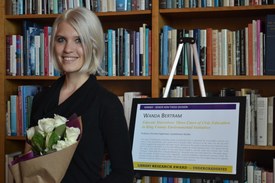 |
Wanda Bertram (International Studies) Educate Yourselves: Three Cases of Civic Education In King County Environmental Initiatives The state of Washington, and King County in particular, have a reputation for vocal public concern over issues of the environment, and a quick look at popular ballot initiatives in the state over the last half-century supports the stereotype. But most recent initiatives to the people concerning environmental issues have not fared on the ballot in a way that reflected support for conservationist policy. The inquiry driving this paper arose from the failure of one such ballot initiative, and the claim that citizens who voted “wrongly” could easily have “educated themselves” about the issue and voted otherwise. This paper argues that the people of King County have repeatedly received inadequate educational resources about the ecological issues at stake in local politics. The lack of such resources may have helped special or regional interests overpower collective interests in decisions on these measures. Access: Project ©Reproduction of this award project in part or in whole without permission of the author is expressly prohibited. |
|
|
Garrett Knoll (Aquatic and Fishery Sciences) A Giant in a Changing Ocean: Unveiling the Mysteries of the Greenland Shark The Arctic is a changing ecosystem that supports a wide diversity of organisms. Multi-year ice in the Arctic is declining due to warming temperatures and being replaced by thinner first year ice. This change in sea ice will have drastic effects on ice-dependent animals and sea ice algae. It is thus extremely important to get baseline data on the organisms that inhabit the Arctic waters and their food web dynamics. The Greenland shark (Somniosus microcephalus) is one particular inhabitant that has garnered an increasing amount of attention. This shark is the largest fish in the Arctic and it is the only shark that can withstand the cold Arctic waters year-round. It plays an important role in the Arctic ecosystem and could have an advantage over most Arctic predators because it is more of a generalist feeder rather than the specialist feeders like the narwhal. Access: Project ©Reproduction of this award project in part or in whole without permission of the author is expressly prohibited. |
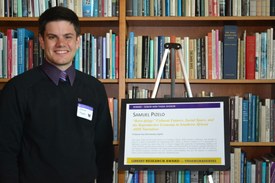 |
Samuel Pizelo (English Literature) “Born Dying:” Cultural Futures, Social Space, and the Reproductive Economy in Southern African AIDS This essay reads several of the pieces in a Southern African AIDS narrative anthology, and attempts to uncover a space of possibility for representing HIV, which, as Brown reminds us, is a prerequisite to fighting it, or at the very least living with it. I hope to suggest that questions of representing, fighting, and living with HIV are also always questions of culture, and that therefore developing a cultural imaginary of and response to HIV is essential to the longer-term human objective of “becoming with” HIV as a species. This cultural imaginary includes not only semiotic representability, but also the capacity to understand futures, and to transform spatial locales into inhabitable place. Access: Project ©Reproduction of this award project in part or in whole without permission of the author is expressly prohibited. |
Non-senior Division
|
|
Ian Bellows (JSIS & Geography) Crossroads of the World: Intersections of Power and Privilege in the Khumbu The Khumbu region of Nepal, home to Mt. Everest, has served as crossroads of cultures for centuries. In the latter half of the twentieth century, a system of international expedition mountaineering became firmly entrenched in the region, creating economic opportunities but perpetuating hierarchies of power and privilege between foreigners, Sherpas, and other Nepalis. This case study examines the work of the nonprofit Khumbu Climbing Center (KCC) and its disruptive effects on the both traditional economic and social structures and the expedition mountaineering paradigm. In ways both intentional and unintentional, it is rewriting the rules of who can climb the highest mountains on earth and profit from Nepal’s lucrative tourist industry. This exploration helps to illuminate the complex and colliding social, environmental, economic factors surrounding adventure travel and development. Access: Project ©Reproduction of this award project in part or in whole without permission of the author is expressly prohibited. |
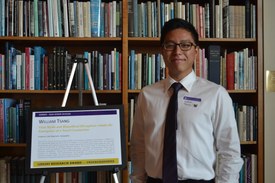 |
William Tsang (Public Health) Viral Myths and Biopolitical Disruptions Amidst the Emergence of a Novel Coronavirus Since 2012, a novel coronavirus named Middle East Respiratory Syndrome Coronavirus, or MERS-CoV, has infected 491 people and killed 147 in 18 countries— a case fatality rate of almost 30%—twice as high as the 2003 SARS pandemics. An incomplete understanding of its epidemiological and ecological nature has left scientists racing against the clock—but is that all to the story of emerging infectious diseases? This analysis seeks to investigate the hidden narratives amid the dominant epidemiological discourses—of human interdependence rather than of biological susceptibility—through the counter-authoritative framework of “viral myths”. I will explore discourses in obscuring viral nomenclatures, the biopolitics of insecurity, the commodification of intellectual property rights, and their respective public health implications, which hurtles us toward an embodiment of both molecularized and globalized precarity. This heterogeneous collection of “viral myths” amid the MERS outbreaks serves as a microcosm for past, present, and future infectious diseases Access: Project ©Reproduction of this award project in part or in whole without permission of the author is expressly prohibited. |
Honorable Mentions
Morgan Galloway (Political Science)
Faculty Advisor: Rebecca Thorpe, Political Science
Senior Thesis: Blackhawks and Human Rights: The Impact and Consequences of Short-Term Incentives in Militarizing “Plan Colombia”
Azeb Madebo (Communication & Anthropology)
Faculty Advisor: Ralina Joseph, Communication
Senior Thesis: Re-Imagining Identities: Racial and Ethnic Discourses within Seattle’s Habesha Community
Hope St. John (Urban Studies & Global Studies)
Faculty Advisor: Lisa Hoffman, Urban Studies, UW Tacoma
Senior Non-Thesis Project: Ai Weiwei and Maoist Legacies in the Reform Era
Samantha (Jing) Xue (Accounting & Information Systems)
Faculty Advisor: Atanu Lahiri, Foster School of Business
Senior Non-Thesis Project: Drama in the TV Industry: A Study of New Entrants, New Services and New Consolidations
Chris Lower (Sustainable Urban Development, UW Tacoma)
Faculty Advisor: Yonn Dierwechter, Urban Studies, UW Tacoma
Non-Senior Project: Rise of Cities as Catalysts for Effective Climate Action in a Post-Westphalian Landscape
Erika VanHorne (History & Economics)
Faculty Advisor: Richard Johnson, History
Non-Senior Project: An Examination of Widow’s Status within the Orphan Chamber of New Amsterdam

